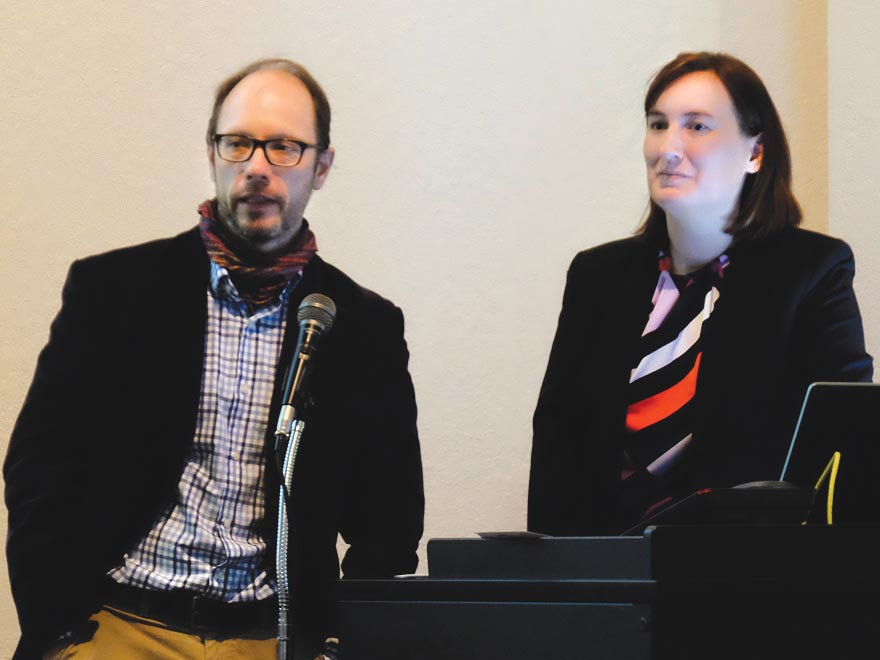
Photo: Alain Ekmalian
Staff Report
Ghevond, the only contem-porary historian of eighth century Armenia, sheds important light on the early experience of the Armenians with the Arab Caliphate.
It was for this reason that Dr. Sergio La Porta and Dr. Alison Vacca decided to collaborate on a new English translation of Ghevond. They shared some of their efforts with an audience at a lecture on “An Armenian Narrative on Early Islam: Ghevond’s History,” on Friday, January 26, as part of the Armenian Studies Program Spring Lecture Series, funded by the Leon S. Peters Foundation.
The presentation was or-ganized in two parts, with Dr. La Porta speaking first, discussing the earliest known manuscript of Ghevond. He placed the History in a literary context with other Armenian histories, and explaining how Ghevond differed from them.
The earliest known manuscript of Ghevond’s History is dated between 1274 and 1311 and is found in the Matenadaran Manuscript Library in Yerevan. The scribe Sarkis copied the manuscript at the monastery of Hovanavank. Dr. La Porta explained that the original colophon (memorial note) of Ghevond and the scribe have been preserved in the manuscript and so it is possible that Sarkis copied his text from the original.
Ghevond composed his History in 788 at the request of Shapuh, a member of the Armenian noble Bagratuni family. Dr. La Porta explained why this was an opportune moment for the author to look back and reevaluate the 150 years of Caliphal rule over Armenia. On the one hand, it was clear by this point that the Islamic Empire was something that was going to last. On the other, the Caliphate itself had just witnessed a revolution in 750. In that revolution the ruling Umayyad dynasty was overthrown by the Abbasid dynasty and this called into question the loyalties and allegiances of the Armenian noble families (nakharars).
Ghevond’s History forms part of the chain of Armenian history that can be traced through a continuous series of Armenian historians, from Agatangelos covering the period of the fourth century up to the eighth century. Ghevond differs from these earlier Armenian historians, however, in that he organized his work according to Caliphal rule and Dr. La Porta stated that Ghevond is the only Armenian historian to have done so. After Ghevond mentions each Caliph, he also provides a brief biographical sketch, a technique shared with Arab and Muslim historiography.
Dr. La Porta concluded by saying that Ghevond’s message was one of patience and caution. Although Ghevond believed that the Armenian situation under the Caliphs, especially toward the end of the eighth century had worsened, he still asserted that the failed eighth century rebellions were not good for Armenia.
Dr. La Porta then introduced Dr. Alison Vacca and related how she had studied classical Armenian with him and then went on to earn her doctorate from the University of Michigan, Ann Arbor. She is currently an assistant professor in the Department of History at the University of Tennessee, Knoxville, and her dissertation has recently appeared as a book entitled, Non-Muslim Provinces in Early Islam: Islamic Rule and Iranian Legitimacy in Armenia and Caucasian Albania.
Dr. Vacca, in the second part of the presentation, discussed how Ghevond’s work related to early Arab histories of the period. She noted that the regions conquered by the Caliphate in the seventh century remained Christian-majority provinces in the eighth. She emphasized that non-Muslim historical texts are critical for the understanding of Islamic history and should be considered as insider sources, not as external witnesses, to the history of the Caliphate. Dr. Vacca pointed to Ghevond as a good case-in-point.
According to Dr. Vacca, even though contemporary Arabic accounts of the invasion of Armenia probably existed, they only survive in snippets; therefore, “Ghevond is a particularly important witness to what was happening in Armenia.” However, Ghevond’s History presents more than a history of Armenia; its author also writes about significant events outside of Armenian history. For example, his works gives us important information on the Arab civil wars, on the Arab wars with the Khazars, on the Abbasid revolution, and even a failed Arab invasion of China.
Dr. Vacca also spoke to whether Ghevond had access to Arabic histories for his own work. She commented that there is no absolutely certain textual evidence that he did. Nonetheless, she led the audience through two passages in which she argued Ghevond was in conversation with Muslim sources.
The lecture by Dr. La Porta and Dr. Vacca shed new light on this important Armenian source.
 Hye Sharzhoom Armenian Action
Hye Sharzhoom Armenian Action